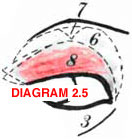Paul Hamill
Minotaur: Anatomy
Creatures of Impulse
A minotaur is human
And animal, as I am,
But sadly misassembled:
Bullheaded rage in charge,
The intellect uncertain
But certainly vicious,
The body heroic but useless.
Of the many reasons
Why such a terror is sad,
The greatest is the absence
Of the best animal gifts:
The beast in humans is
The fountain of pleasure,
The hearth of fellowship,
The instrument on which
We play our harmonies;
And though it is a source
Of disorder in the house
The best are full of beast:
Energy, bravery, laughter.
Plato tells young men
To join the drinking bouts--
"The Dionysian chorus"--
To learn to talk and act
Where passions have loose rein,
For the same wines are poured
At feasts and in the state.
The minotaur is the guest
Who cannot sing with others,
Who ends with blood or bawling.
People who love to run things
People who love to run things
Rarely sense the monsters
Below the workaday.
They know that something volcanic
Rouses at dusk in brothels
And rough bars, and secretly
In themselves: they call it lack
(Of manners, family, class,
Best schools, or character).
They blind themselves to why
It rages at ledgers and dockets;
They have not scanned the books
That even the most bankrupt
Keep on their lives.
When these dutiful servants
Of power see their own lives
As thin, their first impulse
Is to work more doggedly,
Clinging to procedures,
Holding fragments in place.
But as authority melts
The counsel of despair
Is strangely self-abandoned:
To immerse in the destructive,
Give it weight of law,
Taking upon their shoulders
Its immeasurable importance.
After Many China Shops
A few know their own dangers
Because they have destroyed
Many a china shop.
The truly compulsive do not
Romanticize control,
Whether of self or society;
Like Minos, they learn to imprison
Or hide what raged in their lives,
Or—desperate to defeat
Their darkness—like Ariadne
Enlist a rival obsession.
If they must fight by proxy
Like her, their story becomes
Their savior's, a new maze.
To those close to the boozer,
The spender, the satyr, the gambler,
The compulsive bully, or one
Hooked on rage, the beast
Is ugly and commonplace.
It fascinates only one
Whom it has means to destroy.
The Flame-Born
If a whole nation spasms,
The sparks come from a few
Who come alive amid
The flames and nowhere else,
Helped by the cynical
Who profit by the firestorm.
The mob's one minotaur,
The powers that enrage it
By privilege, another.
The Untempted
One who always refrains
From tempting himself becomes
A hero of trivial ways:
Proud of holding his post
In the seething colony
That is human nature, yet wistful:
For impulse runs free in the world
While he is his own jailer.
If he has fantasies—
Ten million in the lottery,
A pass to muslim heaven,
His enemies at cliff-edge
And no one to see him push—
He wakes up fearful that glee
At these unmerited riots
Would throw him into a pit
To learn he cares for nothing.
Convinced of essential loneness,
He panics when gates fall open
And voices inside growl
"Till now we toyed with you."
The Usual Lightness of Passions
Most people are lightly mastered
By passions. They are not shaken
By the vision of insignificance
That comes as impulse fades.
Instinctively hostile
To difficult aspirations,
They take what comforts come
As the key truths of their lives.
Like heifers freed of the pen,
Frolic but easily panicked,
They browse in time's broad pasture
With endless time to pass.
____
During a time of great personal struggle, I began reading and even dreaming about minotaurs. I began to imagine a sort of field guide to the labyrinth of human fears, in which the minotaurs are mirrors of ruling angers or anxieties. This poem is one part of that mapping.
